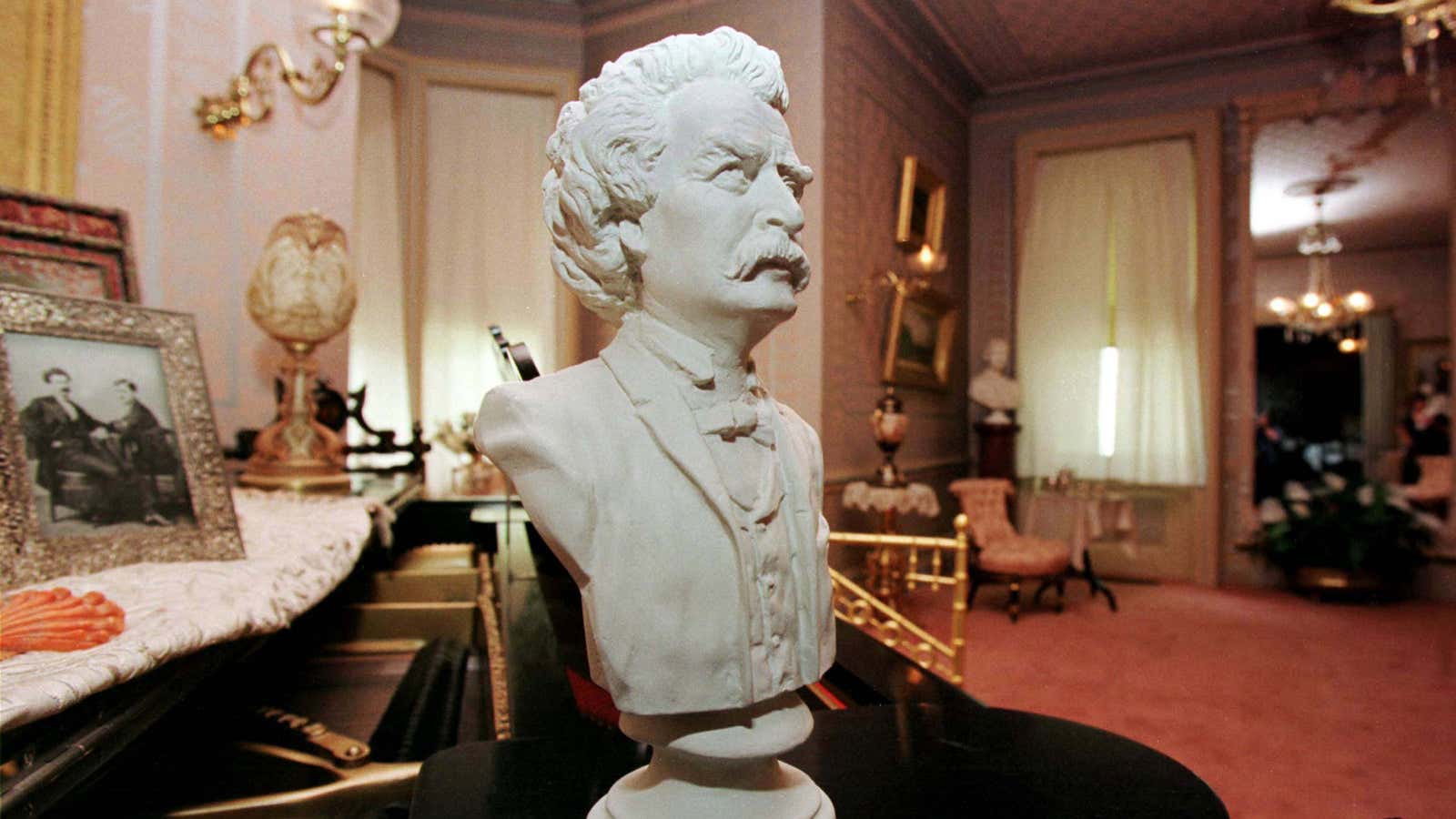Update: Fifteen days after publication of this article, the Library of Congress apologized for its “egregious lapse” in the editing and publication process of its Mark Twain book.
Mark Twain once joked that “whenever a copyright law is to be made or altered, then the idiots assemble.” A lesser-known fact of Twain’s life is that he lobbied vigorously for stronger copyright protections, vexed by piracy of his work both at home and abroad. “They talk handsomely about the literature of the land,” Twain told a House committee in 1906. “And in the midst of their enthusiasm, they turn around and do what they can to discourage it.”
The “they” Twain referred to were the laws and lawmakers themselves. And in the United States, copyright law is administered by the Copyright Office, which is a part of the Library of Congress. So it’s no small irony then that a new book about Mark Twain, “co-authored by” the Library of Congress, appears to contain text copied from at least five different sources, all with no attribution.
An independent scholar, Kevin Mac Donnell, whose sleuthing I’ve written about before, announced earlier this month on a Mark Twain web forum that he uncovered a hefty amount of plagiarism in Mark Twain’s America, an illustrated biography by Harry Katz and the Library of Congress, and published by Little, Brown.
In his review of the book, Mac Donnell noted that its chronology of Twain’s life seemed to be lifted without attribution from Mark Twain A to Z, a reference book by R. Kent Rasmussen. Mac Donnell counted over 400 lines of prose that match Rasmussen’s text almost word for word. More scholars have since joined Mac Donnell on the forum in scrutinizing Mark Twain’s America, and they now say the text includes over 100 factual errors as well.
For example, a photo purporting to show the author’s home in Hartford is, in fact, a picture of a house Twain never lived in. The scholars are compiling a complete list of the book’s inaccuracies to publish on the Mark Twain forum in the near future.
Of course this wouldn’t be the first time a sentimental survey of American history timed for a Christmas release featured a striking lack of original writing or fact checking. (A couple of books by Doris Kearns Goodwin jump to mind.) These accusations now surface about authors with alarming regularity. But what does it suggest about the state of American letters when the latest transgressor cited is actually one of the country’s oldest and most venerable libraries — the very institution where authors register their copyrights?

Indeed, how the Library of Congress proved capable of signing its name to any work, let alone one that included plagiarism, is curious in itself. The acknowledgments section of Mark Twain’s America lists several current and former library staffers, as well as interns. It seems the institutional authorship is meant to reflect their collective contributions to the book, rather than any individual effort.
That is, with the exception of the efforts and contributions of the book’s co-author, Harry Katz – himself a former Library of Congress curator. He did not respond to requests for comment before the time of this article’s publication.
For Twain’s part, although capable of extreme bouts of cynicism, he wouldn’t have predicted such a gaffe. Congressmen have “the smallest minds and the selfishest souls and the cowardliest hearts that God makes,” Twain wrote. Yet he seemed to admire the work of Capitol Hill librarians, once penning a letter that said, “A public library is the most enduring of memorials, the trustiest monument for the preservation of an event or a name or an affection.”
Mac Donnell, who holds a master’s in library science, told Quartz the revelation was “a huge disappointment.”
“I respect the Library of Congress and admire the work they do,” he added. “The vulgarity of this whole thing is not just toward Twain scholarship or Mr. Rasmussen, who is basically the victim here. It’s an insult to librarians and curators and everybody who works in the Library of Congress.” The Library of Congress declined to comment on the matter.
Rasmussen, the first author whose work Mac Donnell identified as lifted, also declined to comment for this article, except to confirm that he is considering legal action.
In response to these allegations, Katz and the book’s editor, Tom Wiener (who was a Library of Congress curator at the time of the book’s publication), posted a message on the Mark Twain Forum expressing regret that Rasmussen’s text was “mistakenly omitted” from their acknowledgments and bibliography sections. They promised to credit Rasmussen’s “important contribution to our chronologies” in future editions of Mark Twain’s America and in the ebook, which is also being adapted into a screenplay.
“Regarding factual errors, we deeply appreciate their being pointed out,” Katz and Wiener added. “We are generalist scholars and writers, but, like everyone on the Forum, we seek to be as accurate as possible in our work. We will rectify errors or omissions in forthcoming editions of the book. The review’s pointed criticisms speak to a deep passion for Twain, a passion we all share.”
Since the above statement was issued, additional vetting of the text (work Mac Donnell described as “deadening” “depressing” and “bad for the eyes”) revealed four more sources the authors seem to have cribbed – one of which was copied even more extensively than Rasmussen’s work.
If the controversy escalates, which seems likely, on top of the obvious embarrassment each party will face, US law leaves room for criminal charges when copyright infringement occurs for commercial purposes.
With that in mind, and in the increasingly archaic tradition of referencing secondary sources, I’ll mention that every Mark Twain quote found in this article was accessed via twainquotes.com, a fine resource for anyone interested in the author’s brilliant repertoire of vicious put downs and pithy aphorisms.
That site is curated by Barbara Schmidt, a scholar whose work gathering this material is seldom acknowledged. Her site, right at the top of the page, rather than on the customary bottom, proudly bears her name next to a ©.
